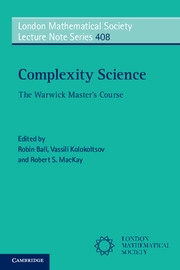Book contents
- Frontmatter
- Contents
- Preface
- List of contributors
- 1 Self-organisations and emergence
- 2 Complexity and chaos in dynamical systems
- 3 Interacting stochastic particle systems
- 4 Statistical mechanics of complex systems
- 5 Numerical simulation fo continuous systems
- 6 Stochastic methods in economics and finance
- 7 Space-time phases
- 8 Selfish routing
- Index
Preface
Published online by Cambridge University Press: 05 June 2014
- Frontmatter
- Contents
- Preface
- List of contributors
- 1 Self-organisations and emergence
- 2 Complexity and chaos in dynamical systems
- 3 Interacting stochastic particle systems
- 4 Statistical mechanics of complex systems
- 5 Numerical simulation fo continuous systems
- 6 Stochastic methods in economics and finance
- 7 Space-time phases
- 8 Selfish routing
- Index
Summary
Complexity Science is the study of systems with many interdependent components.
There is an urgent global need from industry, commerce, research institutions, academia, government and public services for a new generation trained to understand how complex systems behave, how to live with them, to control them and to design them well. We see this in public service management, transport, public opinion, epidemics, riots, terrorism, weather and climate. Relevant technological developments include distributed computing, data management, process control, personalised medicine, disease management, environmental sensor swarms, complex materials and nanobiotechnology.
Stimulated by problems from such a wide range of scientific disciplines, it presents great challenges and opportunities for Mathematics. Mathematics is essential for a deep understanding of complex systems and how to quantify their behaviour, for conclusions of genuine value to end-users, because of its powers for description, abstraction, deduction and prediction.
A range of Complexity Science concepts unify the field across disciplines: dynamics and diffusion, interacting agents and networks, coherent structures, emergence and self-organisation, upscaling and model reduction, quantification of complexity, scaling and extreme events, probabilistic modelling and statistical inference, feedback and control, diversity, optimisation and evolution.
This volume presents coherent introductions to the mathematical treatment of some areas of Complexity Science. It is based on some of the lecture modules of the Warwick EPSRC Doctoral Training Centre in Complexity Science.
- Type
- Chapter
- Information
- Complexity ScienceThe Warwick Master's Course, pp. vii - xPublisher: Cambridge University PressPrint publication year: 2013

